Aaron Wall.Author of leading SEO blog , offering marketing tips and coverage of the search space, free SEO videos, and free SEO tools.
The number of internet marketing tools(SEM) launched over the past couple years has been staggering. Many of them are both free and highly valuable. SEO, which was once considered a bit of a seedy niche, has grown with search to become a mainstream marketing practice."
Top Top Search Engine Marketing (SEM) Tools
The mainstream marketing practice:
- Google providing Webmaster Central, a blog for webmasters, & many of the best free SEO tools
- Yahoo! offering a paid inclusion service & a webmaster focused tool by the name of Site Explorer
- Microsoft offering SEO services
This article aims to highlight the best search engine marketing tools.
Keyword Research
Keywords are at the core of search, so any effective SEO campaign starts with keyword research. My 4 favorite keyword research tools are
- Google AdWords Keyword Tool
- SEO Book Keyword Tool
- Google Traffic Estimator
- Microsoft Ad Intelligence
Google AdWords Keyword Tool
Given Google's enormous search marketshare they have the most keyword data, though typically they have been less open than others with sharing data. Recently the Google AdWords Keyword Tool has started to show estimated search volumes using numbers (rather than graphs).
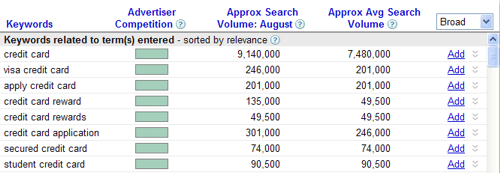
Cool features:
- Match Types: Shows search estimates for exact match keywords (the exact keyword), phrase match (searches containing that keyword as part of the search), and broad match (additionally related searches that may have words in a different order).
- URL Related Keywords: Allows you to enter in a specific page and/or site and find relevant keywords based on that page/site.
SEO Book Keyword Tool
I partnered with the fine folks at Wordtracker to create a free keyword tool powered by their API. The SEO Book keyword tool acts like a meta search keyword tool, where the results are powered by Wordtracker and link to other related keyword tools.

Cool features:
- Cross referencing: Like search engines, all keyword tools have some biases to them, so the quick ability to compare results from different sources makes this the first keyword tool I typically use.
- CSV Export: This tool offers a quick CSV export option, which makes it easy to create a keyword list that can be inserted into other tools for further analysis (which I will mention in the Google Traffic Estimator & Microsoft Ad Intelligence sections).
Google Traffic Estimator
Google Tra*ffic Estimator is a tool which estimates the number of ad clicks that a particular keyword would get at a particular bid price. Given how ad clickthrough rate can vary greatly based on ad copy the estimates can be a bit rough, but this tool does give relative volumes AND values for keywords.

The addition of click cost estimates makes this a nice tool to submit a keyword list to in order to find out which keywords are the most valuable.
Cool features:
- Bid Price Estimation: If you do not enter in a bid price, they return a bid price that should return your ads in the top position 85% of the time.
- Match Types: Shows search estimates for [exact match] , "phrase match", and broad match. In this context it is easy to see how long the tail is for a keyword.
Microsoft Ad Intelligence
Microsoft Ad Intelligence is an Excel Plug In for Excel 2003 and Excel 2007.
It is similar to a combination of the Google AdWords Keyword Tool and the Google Traffic Estimator, with a couple additional features included.

Cool features:
- Real data: One of the ways Microsoft is playing catch up in search is providing their actual search data via this tool (these search counts are the same data set that they use internally). Most search services offer somewhat doctored up estimates.
- Near realtime: This tool offers many advanced filters, which allow you to sort data as recently as yesterday.
- Category based keywords: You can find the all time top category based keywords, or category based keywords that have recently become popular... a service that is great for niche publishers.
Search Analytics Tools
If you are not using web analytics you are flying blind. Analytics data gives you the power to refine your strategy based on what is working and what is not. 3 of my favorite analytics tools are:
- Google Analytics
- Clicky
- Mint
Google Analytics
Google Analytics is a robust free analytics tool. The only concern I haveGoogle Trends for Websites with using it is that if you are profiting from a market inefficiency you might be revealing that inefficiency to the largest online ad network... which may then reveal it to other people. With their large search marketshare, their free keyword tools, industry benchmarking data, and the launch of Google Ad Planner (still in beta), Google Trends for Websites, and Google Insights for Search, Google is the leading source of keyword and market data for many online businesses.
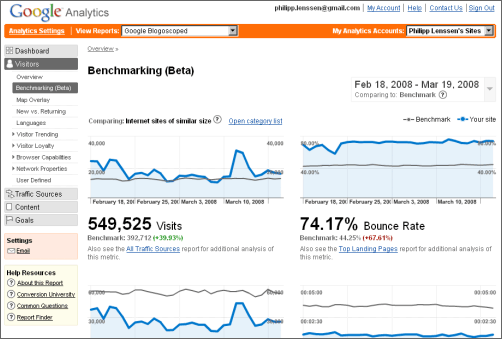
Clicky
Clicky is an inexpensive web based analytics tool. In addition to being fairly feature rich, they also offer a white label service that allows webmasters to resell their analytics product.

Mint
Mint is an analytics program you can install on your server for a one time $30 licensing fee. It offers realtime data and has a wide array of extensions that display information in convenient panes, but is not as feature rich as the above options.


More Analytics Tools
There are a wide array of analytics tools on the market. There are niche tools specifically for PPC campaigns like Optimize My Site and Tracking 202, as well as higher end offerings from companies like Omniture... finding the right tool for your needs is largely a function of defining your needs and budget, and if your budget is quite extensive it might make sense to program something in house.
Search Engine Rank Checkers
While most successful SEO professionals pay more attention to traffic trends, conversions, and profits - it is still helpful to track where some sites rank for certain keywords. Tracking how sites move in the rankings for specific keywords gives you clues as to when search engineers change the weightings on things like domain authority, anchor text, and related words.
While Google Webmaster Central shows you some keywords you rank for, they do not show you the keywords you rank on page 5 or 6 for... just the keywords where you show up near the top of the search results often. Years ago Google had a useful search API, but more recently they have been using an Ajax API which does not work well with rank checkers.
My 2 favorite rank checkers are
- SEO Book Rank Checker
- Advanced Web Ranking
SEO Book Rank Checker
This free rank checking tool is a Firefox extension which allows you to track how you rank in the search engines for a variety of keywords.

Cool features
- International: It works with international versions of Google.
- Automated: Allows you to create preset lists which automatically run at a set periodicity .
- Exportable: Allows you to export the results and see how rankings for a keyword have changed over time.
Advanced Web Ranking
Starting at $99, Advanced Web Ranking is one of the more popular desktop search engine rank checking tools.
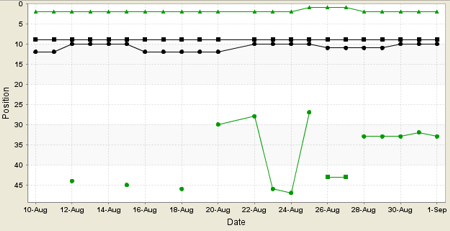
Cool features
- Graphs: Allows you to view graphs of how your rankings change over time.
- Wide Selection of Search Engines: If you live in China, Russia, or another market where Google is not the clear market leader, then this tool will still work for you, as they allow you to track rankings in hundreds of search engines.
Link Analysis Tools
Link analysis is a field which has lost a bit of its importance over the past couple years. Google has clamped down on paid links, web directories, and article directories. At the same time more people are blogging online, and more webmasters have become aware to the field of public relations and the value of links. These combine to make it is much harder to catch up with a competitor if you are trying to duplicate their link building strategy.
To some degree link analysis has moved away from PageRank and anchor text toward analyzing news in the marketplace and understanding why stories are spreading (link analysis is evolving into media analysis and public relations). Here are 6 of my favorite link analysis tools
- Yahoo! Site Explorer
- Google Blog Search
- Google Webmaster Central
- SEO Link Analysis
- Xenu Link Sleuth
- Advanced Link Manager
Yahoo! Site Explorer
Google and Microsoft generally show rather limited link data to the public. Yahoo! Site Explorer shows a much deeper and more representative sampling of inbound link data.

SEO Link Analysis
SEO Link Analysis is a free Firefox extension that adds link anchor text, PageRank score, and if a link is nofollowed to Yahoo! Site Explorer results.
Google Blogsearch
While Google tends to show a small sample of backlinks their Blogsearch is much better at detecting new links from blogs.
Google Webmaster Central
If you verify you own a website inside Google Webmaster Central, they will allow you to download a list of links pointing at your site. If you notice your rankings for a keyword are decent (but could be better) you could look through some of the people linking at your page and ask them to link at your page using more specific anchor text.
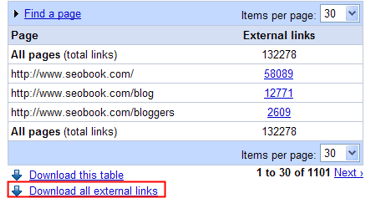
Xenu Link Sleuth
Xenu Link Sleuth crawls websites looking for broken links. This helps you keep your website maximally clean and functional by finding any broken internal links and any references to documents that are no longer online.
Advanced Link Manager
Advanced Link Manager is a paid software package starting at $199 which allows you to automatically track new backlinks obtained by competitors. It also crawls pages to find anchor text, if the link is using nofollow, and the PageRank score of the linking page.
We also created a free tool somewhat similar to Advanced Link Manager, named Backlink Analyzer. We have not updated our tool in a while though, and it is sorely in need of an update.
PPC Tools
As search ad networks have become less transparent many PPC tools that did things like bid gap management have been rendered useless, while Google has built out a powerful AdWords API, an ad platform that allows you to bid per click or per conversion, and the Google AdWords Editor.
- Google AdWords Editor
- Google Website Optimizer
- Speed PPC
- PPC Tools suite
- PPC Analytics Tools
Google AdWords Editor
Google AdWords Editor is a free desktop tool advertisers can use to quickly edit their AdWords campaigns in bulk.
Google Website Optimizer
Google Website Optimizer is a free tool that makes it easy to test and improve your landing page and conversion process. Conversion Rate Experts offers a great overview article about how to take advantage of Website Optimizer and other conversion boosting tools.
Speed PPC
Speed PPC is a paid desktop software program which makes it easy to generate many cross referenced ad campaigns and landing pages for geo-targeted keyword combinations. At $497 Speed PPC is not cheahow to take advantage of Website Optimizer and other conversion boosting toolsp, but if it is beyond your means and you are a good programmer then Zipcode Guy offers a free database of U.S. cities and zip codes.
PPC Tool suite
My wife has build a free collection of useful web based PPC tools including a keyword list generator, a keyword list cleaner, a typo generator, a keyword wrapper, an ad group generator, and a ROI calculator.
- The keyword list generator can be good for creating a quick list of keywords to plug into a PPC account to see what variations get the most search volume, then trim back the fat after you collect some account feedback data.
- The keyword list cleaner is good for taking a dirty keyword list and making it useful. For example, lets say you have a list of MP3 player related keywords. This tool allows you to quickly filter out any keywords related to car and automotive MP3 players.
- The ad group generator makes it easy to create ad groups for Google AdWords, Yahoo! Search Marketing, and Microsoft adCenter at the same time.
PPC Analytics Tools
- Many big affiliate marketers create their own bid management software, but newer affiliates may find tracking tools like Optimize My Site and Tracking 202 useful.
- Many enterprise level websites create custom bid management software for their company, but for enterprise level merchants who do not manage paid search in house, firms like Efficient Frontier can help with management.
Competitive Research
Services like comScore and Hitwise have been around for many years for the people who could afford to buy their data, but their price points are north of what most people are willing to pay. Competitive research is one of the areas which has improved the most in the past few years, largely by a number of companies making products and tools at a more accessible price point. Here are 5 of my favorite competitive analysis tools.
- Compete.com Search Analytics
- Google Website Trends & Google Insights for Search
- Microsoft Ad Intelligence
- KeyCompete
- SEO Digger
Compete.com Search Analytics
Much of the consumer facing innovation in the competitive analysis industry stemmed from Compete.com launching with free basic analytics data, and using a credit based system that allowed anyone to buy competitive data for as little as $20. Since then they have changed their pricing model to one based on a flat monthly fee starting at $299 a month. Here are some of their top keywords for blogoscoped.com... and they offer the option to download hundreds more

Cool features
- Category based top keywords: they were one of the first services to offer top keywords by category (this feature has since been cloned by Microsoft Ad Intelligence and Google Insights for Search).
- Weighting based analytics: they not only show popular keywords sending traffic to competing sites, but they show the approximate percent of traffic driven by each keyword.
- Organic vs paid breakout: they break out which traffic came from organic search vs paid search ads.
Google Website Trends & Google Insights for Search
Google Trends for Websites displays related sites, related search queries, and what countries a website is popular in. Google Insights for Search shows category related keywords, top search terms related to the keyword you entered, and top rising related keywords.
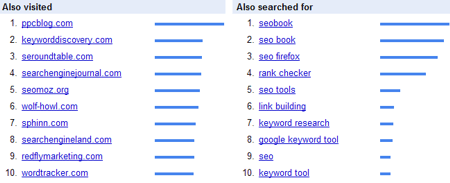
Microsoft Ad Intelligence
Microsoft Ad Intelligence, also covered in the above keyword tools section, offers top category based keywords and allows you to research keywords based on campaign association with competing advertisers (along with confidence estimates).
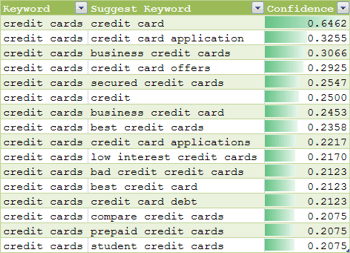
KeyCompete
KeyCompete is a paid tool that lets you find what keywords competing advertisers are buying. This tool is especially powerful for affiliate marketers, where many of them resell the same product or service and need to get a baseline idea of what competitors are doing. SpyFu offers a similar service.
SEO Digger
SEO Digger is similar to KeyCompete, but is free and works on showing what organic keywords a website is ranking for. URLTrends, which is currently undergoing redesign, is similar to SEO Digger.
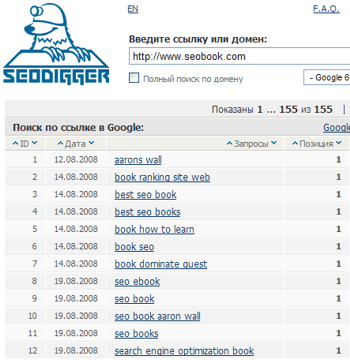
By:Aaron Wall
[Source of first image Creative Commons-licensed by Brian Caldwell.]




1 comments:
I used SEO digger to look up my blog. No results. lol ... looks like there is work to do!
My first post contains a link another list of the top SEM tools. Most of them are covered here but there are a few extras listed in my blog.
Looking forward to reading your new posts.
Post a Comment